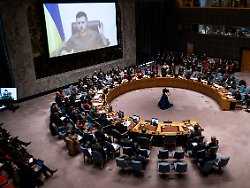Blockades in the UN Security Council
Reform forces veto powers to justify
4/26/2022, 8:53 p.m
After the attack on Ukraine, Russia is blocking its own sentencing in the UN Security Council. In order to make it more difficult for the five veto powers to abuse power in the future, the General Assembly is now deciding on a reform.
The United Nations General Assembly has unanimously adopted a resolution to counteract the use of the veto by the permanent members of the Security Council. The decision, introduced by Liechtenstein and supported by Germany and a number of other countries, requires a meeting of the General Assembly within ten days of each use of a veto in the Security Council. The states that have exercised their right of veto would then have to justify themselves in the body with all representatives of the 193 countries.
The resolution is intended to put pressure on the veto powers to refrain from their privilege of blocking any legally binding decisions by the most powerful UN body. The USA, Russia, China, Great Britain and France, which emerged as the most powerful countries after World War II, were given veto rights in a compromise on the founding of the United Nations.
Russia and the United States in particular have exercised this right since 1946, with a total of over 200 vetoes. China has used it more and more frequently in recent years, albeit much less frequently overall. Britain and France last vetoed it in 1989. Germany, Brazil, India and Japan do not see the current global balance of power reflected in the Security Council and have been trying to reform it for years.
Call for Russia’s expulsion from the Security Council
Most recently, the pressure for a reform of the UN Security Council had increased in view of the Russian war of aggression in Ukraine. As a permanent member of the council, aggressor Russia had blocked all measures to calm the conflict. Calls for sanctions or even Moscow’s exclusion from the Security Council grew louder. According to the UN Charter, however, this is practically impossible because Russia could also veto the curtailment of its own rights.
The reform decision of the General Assembly was not actively opposed by Russia and was even supported by the United States. The new justification measures in front of all member states may be unpleasant for the veto powers, but their power will not be curtailed.
